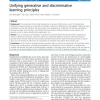37 search results - page 1 / 8 » The Minimum Information Principle for Discriminative Learnin... |
UAI
2004
13 years 6 months ago
2004
Exponential models of distributions are widely used in machine learning for classification and modelling. It is well known that they can be interpreted as maximum entropy models u...
BMCBI
2010
13 years 5 months ago
2010
Background: The recognition of functional binding sites in genomic DNA remains one of the fundamental challenges of genome research. During the last decades, a plethora of differe...
WAPCV
2007
Springer
13 years 11 months ago
2007
Springer
We present an experimental comparison of the performance of representative saliency detectors from three guiding principles for the detection of salient image locations: locations...
ICPR
2004
IEEE
14 years 6 months ago
2004
IEEE
We present a pattern recognizer to classify a variety of objects and their pose on a table from real world images. Learning of weights in a linear discriminant is based on estimat...
ICASSP
2011
IEEE
12 years 8 months ago
2011
IEEE
The power of sparse signal coding with learned overcomplete dictionaries has been demonstrated in a variety of applications and fields, from signal processing to statistical infe...

